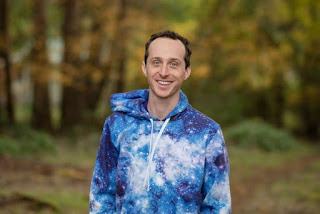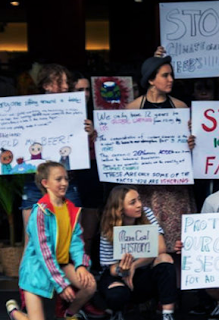"Feeling miserable, anxious, helpless and just generally terrible because the world is becoming less habitable? You're not alone.
"The
good news is there are strategies that may help you cope. The bad news
is the pandemic we're now facing may test your passion and enthusiasm
for climate action.
 |
Kurtis Baute recently sought out
professional help to cope with
his despair about climate change.
(Supplied: Kurtis Baute) |
For the past 18 months, Canadian scientist Kurtis Baute says he has been dealing with a lot of 'climate grief'.
"Basically
I can't stop thinking about the fact that millions of people, real
people, are dying or will die because of something that is completely
unavoidable," he recently announced on his YouTube channel.
"We
can stop using fossil fuels but so far we've completely failed to do
so...it feels completely out of control and it's depressing."
Climate grief — or eco anxiety/despair — is a strong
psychological response to the current and future loss of habitats,
species and ecosystems.
It's recognised by the
Australian Psychological Society (APS) and sufferers may feel emotions
like fear, anger, guilt, shame, grief, loss and helplessness.
It
can be related to the direct impacts of climate change, such as drought
or bushfire. But it can also take the form of a sense of doom or even
existential crisis about our warming world.
In some ways it's a lot like the grief we experience when someone dies.
The health industry predicts it will be common place in the next 10 years.
 |
| Becoming more environmentally engaged |
The danger of unvalidated grief
Climate
grief is often categorised as a form of disenfranchised grief which
means it isn't always publicly or openly acknowledged.
"There's
no ritual around loss of environment," says Tristan Snell, a
counselling psychologist and researcher in environmental psychology at
Deakin University.
"When you lose someone, there's a funeral and all
sorts of ways people connect and this helps process that loss. That's
just not the case for loss of environment."
People
experiencing disenfranchised grief can feel unsupported or
ashamed, and
consequently can be very reluctant to talk with friends, family or a
professional.
 |
| The thought of climate catastrophe can be overwhelming |
"People may feel this isn't something someone else can help with," says Dr Snell.
This can then snowball into major physical and mental health problems.
Some will feel this more than others
Researchers,
including Dr Snell, are currently trying to gauge the mental health
impacts of climate change and recent climate-related events on
Australians with this survey which you can get involved in.
 |
| Climate change is causing grief |
"How to cope
Clinical psychologists are developing strategies to help people work through climate grief, but research is still quite limited.
However you may find the follow tactics help with feelings of emotional distress:
• Become more environmentally engaged by getting involved in land care or tree planting for example — taking action to better the planet is thought to relieve some anticipatory grief
• Spend time in nature to remind yourself it's a source of strength
• Talk with like-minded family or friends and if needed, seek professional help"
Read the complete ABC article
Related: We need action to prevent further catastophic fires and we need to be prepared for wildfires
#cambio-climatico, #climateaction, #climate crisis, #climateemergency, #criminales-climáticos-de-la-cárcel, #jailclimatecriminals, #人类灭绝, #气候变化, fossil fuel industry,
No comments:
Post a Comment